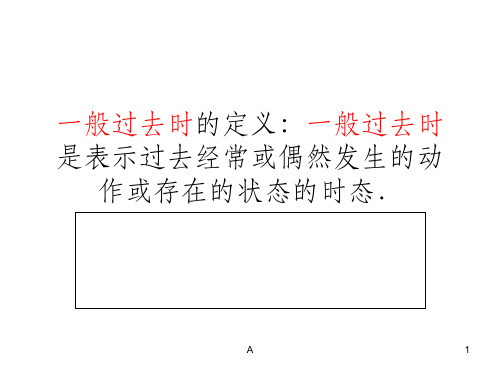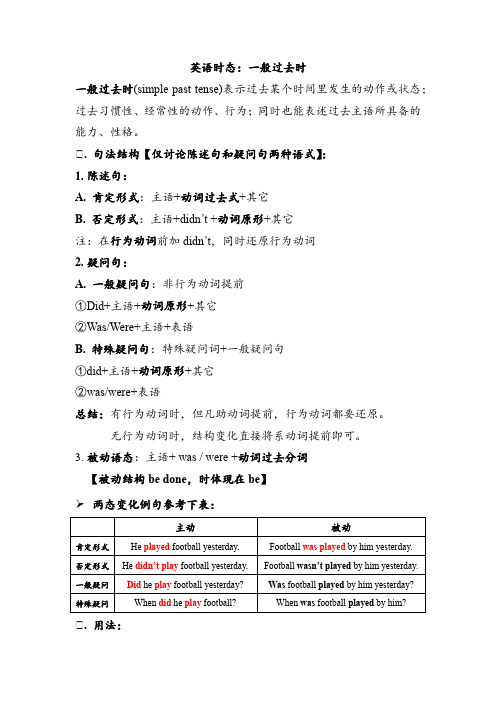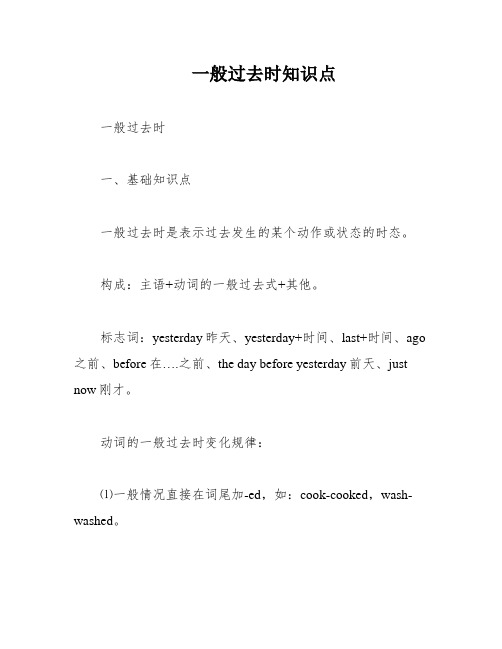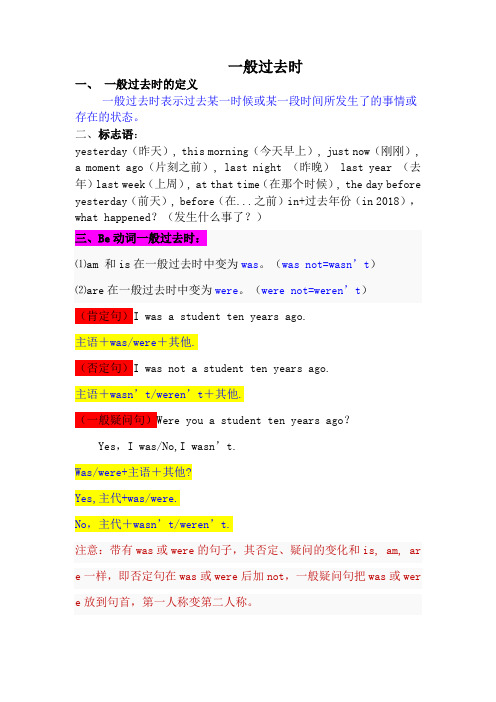一般过去时
一般过去时的定义

作或存在的状态的时态.
A
1
• 一般过去时用动词的过去式,动词的过去 式一般都加ed,如work worked.结尾是e 的只加d,如like liked.末尾只有一个辅音字 母的重读闭音节要双写这个字母再加ed,如 stop stopped,以辅音字母加y结尾的,先 变y为i再加ed,如study studied.
A
4
• 一般过去时有什么句型构成
• 1。 情态动词变过去 can-could / will-would / may-might / shall-should
• 2。 BE动词变过去 am-was / are-were / is-was /
• 3。 实义动词变过去 go-went / do-did / see-saw / talk-talked /
•
否定句:
ห้องสมุดไป่ตู้
______________________________________
____
•
一般疑问句:
______________________________________
__
•
对划线部分提问:
____________________________________
A
6
• 1. My mother ________________ (not do) housework yesterday.
• eg: I am a student. I was a student.
• Mary goes to school at seven. Mary went to school at seven.
一般过去时

三.一般过去时(simple past tense)1.概念一般过去时表示过去某一时刻,某一段时间发生的动作或存在的状态。
一般过去时用动词的过去式表示。
2.构成一般过去时用动词的过去式表示。
be的过去式有was,were两种; have 的过去式是had;规则动词的过去式在动词词尾加-ed,具体构成规则如下:1)一般情况,动词后加ed,例词work-worked,clean-cleaned,play-played,wash-washed2)以不发音的e结尾,-d,例词live-lived,move-moved,hope-hoped,arrive-arrived 3)以辅音字母+y结尾,变y为 i再加-ed,例词study-studied,carry-carried,cry-cried,identify-identified 4)以辅音字母结尾的重读闭音节,双写最后一个辅音字母加-ed,例词plan-plannedstop-stopped,beg-begged,grab-grabbed 3.用法 (1) 表示发生在过去的动作或存在的状态。
如:He went shopping with his friends last week.They arrived ten minutes ago.He became a hotel manager ten years ago.Did you go to the concert last night?(2) 表示在过去经常发生的动作或习惯动作。
如:He visited his grandparents once a month last year.She usually went to work by car last year.When I was at school, I always went to school by bus.4.如何识别一般过去时常见的标志词有:1). yesterday, the day before yesterday.2). last week / year / month / term …(简称last系列)3). two hours ago, three years ago, a moment ago…(简称ago系列)4). in / on + 过去的年/月/日,如 in 1999, on April, 20055). just now, once upon a time, one day…5.易错点例析:(1)——Your phone number again? I _________ quite catch it.——It’s 4331577A. didn’tB. couldn’tC. don’tD. can’t(2)——Mr. Smith isn’t coming tonight.——But he _________.A. promisesB. promisedC. will promiseD. had promised(3) ——Hey, look where you are going!——Oh, I’m terribly sorry. _________.A. I’m not noticingB. I wasn’t noticingC. I haven’t noticedD. I don’t notice(4) ——Oh it’s you ! I _________ you.——I’ve had my hai r cut.A. didn’t realizeB. haven’t realizedC. didn’t recognizeD. don’t recognized(5) ——Since you’ve agreed to go, why aren’t you getting ready?——But I _________ that you would have me start at once.A. don’t realizeB. didn’t realizeC. hadn’t realizedD. haven’t realized(6) ——It’s twelve o’clock, I think I must be off now.——Oh, really? I _________ it at all.A. don’t realizeB. haven’t realizedC. didn’t realizeD. hadn’t realizedKey:ABBCBC6.中考真题及模拟(2009朝阳区一模)He went into his room, _______ the light and began to work.A. has turned onB. will turn onC. turns onD. turned on(2009海淀一模)——What’s the best food have you had in Beijing, Alex?——Roast duck! I _________to a famous restaurant to have it last week.A. have goneB. goC. will goD. went(2009宣武区一模)——Do you know how many gold medals the 23-year-old Michael Phelps _____________at the 2008 Summer Olympic Games?——Eight.A. winB. winsC. wonD. has won(2008北京)We were in Qingdao last week and __________ great fun there.A. will haveB. have hadC. hadD. have(2007北京)——What did you do after school yesterday?——I _________basketball with my friends.A. playB. playedC. will playD. am playing(2005北京)---Hi, Kate. You look tired. What’s the matter?---I ______well last night.A. didn’t sleepB. don’t sleepC. haven’t sleptD. won’t sleep (2008四川泸州)Yesterday,Tony’s family _________ a good time.A. hasB. haveC. had(2007湖南湘潭)I’m sorry you’ve missed the train. It _______10 minutes ago.A. leftB. has leftC. had left(2007福州)——Mr Green, __________you________ Three Lanes and Alleys(三坊七巷)last Sunday?——No, but I’ll visit them next week.A. will; go toB. have; been toC. did; go toD. have; gone to (2007浙江)——What did the teacher say just now?——He __________us not to play computer games all day.A. tellsB. toldC. has toldD. is told(2007江西)——Inventors have changed the way we live.——So they are famous for the great things they _________.A. doB. didC. are doingD. had done(06江西)——Where’s the cake I made this morning?——We _______ it, mum. Can you make another one for us?A. ateB. eatC. will itD. were eating。
英语时态:一般过去时

英语时态:一般过去时一般过去时(simple past tense)表示过去某个时间里发生的动作或状态;过去习惯性、经常性的动作、行为;同时也能表述过去主语所具备的能力、性格。
Ⅰ. 句法结构【仅讨论陈述句和疑问句两种语式】:1.陈述句:A. 肯定形式:主语+动词过去式+其它B. 否定形式:主语+didn’t +动词原形+其它注:在行为动词前加didn’t,同时还原行为动词2.疑问句:A. 一般疑问句:非行为动词提前①Did+主语+动词原形+其它②Was/Were+主语+表语B. 特殊疑问句:特殊疑问词+一般疑问句①did+主语+动词原形+其它②was/were+表语总结:有行为动词时,但凡助动词提前,行为动词都要还原。
无行为动词时,结构变化直接将系动词提前即可。
3.被动语态:主语+ was / were +动词过去分词【被动结构be done,时体现在be】➢两态变化例句参考下表:Ⅰ. 用法:1.一般过去时表示在过去某个特定时间发生,也可以表示过去习惯性、经常性的动作。
(一般不强调动作的影响,只说明的事情。
)I talked with Catherine yesterday morning.His mother cooked him breakfast.2.一般过去时常与表示过去的时间状语或从句连用,如:yesterday, last week, in the past, in 1993, at that time, once, during the war, before, a few days ago, when 等。
3.表示过去连续发生的动作时,要用过去时。
这种情况下,往往没有表示过去的时间状语,而通过上下文来表示。
The boy cried for a while,and then drank a cup of tea.4.表示在此之前一段时间内经常或反复的动作。
常与always,never 等连用。
一般过去时

2.We went to Beijing last month .(改为一般疑问 句,并作否定回答)
( C )3. ___ he at school yesterday?
A. Does B. Did
C. Was
( C )4. —___ you in Shanghai last week?
—Yes, I ___.
A. Was; was B. Did; did C. Were; was
( B )5. Class One ___ the football match yesterday
3. meet _m_e_t__ 6. teach _ta_u_g_h_t 9. fly _f_le_w__ 12. drive _d_r_o_v_e 15. tell _t_o_l_d_
二、用括号内所给动词的适当形式填空。 1. Tom and Mary _c_a_m_e_(come) to China last month. 2. Mary _r_e_a_d_(read) English yesterday morning. 3. There _w_e_r_e_(be) no children here ten minutes ago. 4. What __d_id__ you __d_o__ the day before yesterday?(do) 5. Last week wep_i_c_ke_d_(pick) many apples on the farm.
四、单项填空。
一般过去时知识点

一般过去时知识点一般过去时一、基础知识点一般过去时是表示过去发生的某个动作或状态的时态。
构成:主语+动词的一般过去式+其他。
标志词:yesterday昨天、yesterday+时间、last+时间、ago 之前、before在….之前、the day before yesterday前天、just now刚才。
动词的一般过去时变化规律:⑴一般情况直接在词尾加-ed,如:cook-cooked,wash-washed。
⑵以不发音的e结尾的动词,在词尾+d,如:like-liked,live-lived。
⑶以重读闭音节结尾的动词,双写最后一个字母再在词尾+ed,如:ped,shop-shopped,plan-planned。
⑷以辅音字母+y结尾的动词,要改y为i再加ed,如:study-studied,carry-carried。
另外,还需记住不规则动词的一般过去时变形。
二、做题步骤:⑴先找到句子中表示一般过去时的标志词。
⑵确定句子的动词是用be动词还是行为动词。
Be动词的过去时练一、用be动词的适当形式填空1.I was at school just now.2.He was in Beijing on n last week.3.We were students two years ago.4.They were on the farm a moment ago. 5.Yang Ling was eleven years old last year. 6.There was an apple on the plate yesterday. 7.There was some milk in the fridge on Sunday.二、用行为动词的适当形式填空1.He lived in Wuxi two years ago.2.The cat ate a bird last night.3.We had a party last Halloween.4.Nancy picked up oranges on the farm last week。
一般过去时定义,结构,标志词,用法

一般过去时定义,结构,标志词,用法一般过去时是英语中最基本的过去时态之一,它用于描述过去发生的动作或状态。
本文将介绍一般过去时的定义、结构、标志词和用法。
一、定义一般过去时是指发生在过去的动作或状态,不考虑其持续时间或是否已经完成。
它用于描述已经结束的事情,通常与表示过去的时间短语一起使用。
二、结构一般过去时的结构很简单,主要由动词的过去式构成。
对于大多数动词,过去式是在动词原形后加上-ed,如walked,talked,played 等。
但是,有一些动词的过去式是不规则的,需要记忆,如go的过去式是went,eat的过去式是ate等。
另外,一般过去时的肯定句结构为:主语 + 动词过去式 + 其他。
如:I walked to the park yesterday.(我昨天走到了公园。
)否定句的结构为:主语 + did not + 动词原形 + 其他。
如:I did not walk to the park yesterday.(我昨天没有走到公园。
)疑问句的结构为:Did + 主语 + 动词原形 + 其他?如:Did you walk to the park yesterday?(你昨天走到了公园吗?)三、标志词一般过去时的标志词有很多,其中最常见的有以下几种:1. 表示过去的时间短语,如yesterday(昨天)、last week(上个星期)、in 1999(在1999年)等。
2. 过去式的动词,如walked(走)、talked(谈话)、played(玩)等。
3. 过去式的助动词did,如did not(没做)、did you(你做了吗?)等。
四、用法一般过去时通常用于以下情况:1. 描述过去的事件或状态,如:I went to the park yesterday.(我昨天去了公园。
)2. 描述过去的习惯或经常性动作,如:When I was a child, I played with dolls every day.(我小时候每天都和玩偶玩。
一般过去时知识点

一般过去时一、一般过去时的定义一般过去时表示过去某一时候或某一段时间所发生了的事情或存在的状态。
二、标志语:yesterday(昨天), this morning(今天早上), just now(刚刚), a moment ago(片刻之前), last night (昨晚) last year (去年)last week(上周), at that time(在那个时候), the day before yesterday(前天), before(在...之前)in+过去年份(in 2018),what happened?(发生什么事了?)三、Be动词一般过去时:⑴am 和is在一般过去时中变为was。
(was not=wasn’t)⑵are在一般过去时中变为were。
(were not=weren’t)(肯定句)I was a student ten years ago.主语+was/were+其他.(否定句)I was not a student ten years ago.主语+wasn’t/weren’t+其他.(一般疑问句)Were you a student ten years ago?Yes,I was/No,I wasn’t.Was/were+主语+其他?Yes,主代+was/were.No,主代+wasn’t/weren’t.注意:带有was或were的句子,其否定、疑问的变化和is, am, ar e一样,即否定句在was或were后加not,一般疑问句把was或wer e放到句首,第一人称变第二人称。
(特殊疑问句)1.对I提问:Who was a student ten years ago?(Who作为主语时,谓语动词用三单)四、实义动词一般过去时:(肯定句)I walked to school yesterday.主语+动词过去式+其他.(否定句)I didn’t walk to school yesterday.主语+didn’t + 动词原形+其他.否定句变化规则:1、找be动词2、若无be动词,找情态动词(could)3、若无情态动词,请助动词(did)来帮助4、did放于主语的后面,动词的前面,加上not,did not= didn't5、动词变原形6、some->any and->or too->either(一般疑问句)Did you walk to school yesterday?Yes,I did. No,I didn’t.Did +主语+动词原形+其他?Yes,主代+did.No,主代+didn’t.一般疑问句变化规则:1、找be动词2、若无be动词,找情态动词(could)3、若无情态动词,请助动词(did)来帮助4、did放于开头,首字母大写5、第一人称变第二人称6、动词变原形7、some->any and->or too不变either(特殊疑问句)I went to school on foot yesterday.1.对I 提问:Who went to school on foot yesterday?2.对went to school 提问:What did you do on foot yesterday?3.对school 提问:Where did you go on foot yesterday?4.对on foot 提问:How did you go to school yesterday?5.对yesterday提问:When did you go to school on foot?动词变化规则:1、直接在动词后面加ed。
一般过去时

(1)基本用法1. 一般过去时通常用来表示过去某个时间里发生的动作、存在的状况或者过去习惯性、经常性的动作、行为等等。
如:--- Where were you last week 上周你在哪儿--- I was at my uncle's home in the countryside. (上周)我在乡下的叔叔家。
2. 有些情况,发生时间没有明确标明,但实际上是过去发生的,应用过去时态;另外,在谈到已故去的人时,也多用过去时。
如:He bought a cat, and now they are good friends. 他买了一只猫,现在他们是好朋友了。
Lu Xun was a great writer. 鲁迅是一位伟大的作家。
(2)句法结构1、肯定形式主语+动词过去式+其他例句:She often came to help us in those days.2、否定形式①was/were+not;②在行为动词前加didn't,同时还原行为动词例句:I didn't know you like coffee.3、一般疑问句①Did+主语+谓语动词原型+其他②Was\Were+主语+表语例句:Did I do homework?4、口诀一般过去时并不难,过去动作、状态记心间。
动词要用过去式,时间状语句末站。
否定句很简单,didn't 站在动原前,其它部分不要变。
一般疑问句也好变,did放在句子前,主语、动原、其它部分依次站立。
特殊疑问句也简单,疑问词加一般疑问句记心间。
最后一条请注意,动词过去式要牢记!(3)时间状语与一般过去时连用的时间状语有:yesterday(昨天), last night(昨晚), last week (上个星期), four days ago(四天前), in 2002(在2002年), just now(刚才), the daybefore yesterday(前天)等。
- 1、下载文档前请自行甄别文档内容的完整性,平台不提供额外的编辑、内容补充、找答案等附加服务。
- 2、"仅部分预览"的文档,不可在线预览部分如存在完整性等问题,可反馈申请退款(可完整预览的文档不适用该条件!)。
- 3、如文档侵犯您的权益,请联系客服反馈,我们会尽快为您处理(人工客服工作时间:9:00-18:30)。
常与一般过去时连用的词
1.时间状语
• ago(two hours ago(一段时间+ago) • Yesterday(morning afternoon evening ) • The da before yesterday • Last week/year/night···
2.具体时间
• just now
肯定回答: Yes,they did. 否定回答: No,they didn’t. • 肯定回答用“Yes, 主语+ did.” • 否定回答用“No, 主语+didn’t(did not).” • Ps:对于行为动词的一般疑问句一定要注意动词的还原, • 因为时态与数的变化已经体现在助动词上了。
• 口诀:一加二改三问号 一加:即在句首加助动词did; 二改:1、把谓语动词改为原形;
could not = couldn’t must not = mustn’t would not = wouldn’t should not = shouldn’t might not = might not had not to = hadn’t to
• e.g. She had to do her homework yesterday.
• e.g. Were you 13 years old three years ago?
•
They were on the farm just now.
• 否定句: 主语 + be + not + 其他
• e.g. I was not in my house.
2.情态动词的一般过去时
• 主语 + 情态动词 + 动词原形+其他
• Ps:在回答时,主语要用相应的代词代替
• ②含情态动词的一般疑问句
• e.g. Q: Could you speak English last year? 情态动词 + 主语 + 动词原形 + 其它部分?
A:Yes,I could. No,I couldn’t. 肯定回答:Yes,主语+情态动词 否定回答:No,主语+情态动词+not Ps:在回答时,主语要用相应的代词代替
last year. Ps:didn’t之后动词一定要用原形
5. 一般疑问句
• ①含be动词的一般疑问句
• e.g. Q:Were you a student ?
•
be + 主语 + 其它部分?
• A:Yes,I was. No,I wasn’t.
• 肯定回答:Yes,主语+be
• 否定回答:No,主语+be+not
• 主语 + 行为动词 + 其他 • e.g. These boys liked playing football. • The girl read English every morning in 1998
4.否定句的构成
• 主语 + 助动词(did)+not +行为动词原形 + 其他 • e.g. These boys didn’t(did not) like playing football. • The girl didn’t (did not)read English every morning
一般过去时
1.定义
• 表示过去某个时间里发生的动作或存在的状态, 也表示过去经常或反复发生的动作。
1.表示过去某个时间里发生的动作或存在的状态
• e.g. He was twelve last year.
•
She was at work.
2.表过去经常或反复发生的动作
• e.g. She often came to help us in those days. • Mrs. Peter always carried an umbrella..
•
What time did he get up every morning﹖
•
How did you know﹖
• 特殊疑问词+助动词+主语+动词原形+其他? • e.g Where did you do study English? • 特殊疑问词+be动词+主语+其 • e.g Why was your Mum so angry? • 特殊疑问词+情态动词+主语+动词原形+其他? • e.g What could I do for you?
• e.g. who was singing in the room﹖
•
whose bike was red﹖
②如疑问词作其他成分,即对其他成分提问
• 其语序是:疑问词+一般疑问句 ?
• e.g. What class were you in﹖
Hale Waihona Puke •What did she look like﹖
•
Where were you from﹖
• this morning(afternoon, evening)
• at the age of 10(过去时间段) • long long ago(很久以前)
• one day
• the other day(前几天)
• long ago
• at the moment
• once upon a time
一般过去时的构成
1.系动词be的一般过去时
• 主语 + be(was, were) + 其他
• 主语是“I”或单数 时 ----- was
• e.g. I was at school just now.
•
He was a student two years ago.
• 主语为you或复数时 ----- were
Ps:重读闭音节 (1)一个元音字母后跟一个或 几个辅音字母,他们组成的音节 必须是重读音节 (2)以辅音字母结尾 (3)元音字母发短元音。
• Ps.情态动词后的动词一定要用原形,而且只能是情态动词的过去式。
• e.g. They should be right.
• 否定句的构成:主语 + 情态动词 + not + 动词原形 + 其他
• e.g. She could not speak English last year.
3.行为动词的一般现在时
•
2、改换主语称谓;
三问号:句末的句号改为问号。
6.特殊疑问句
• 以疑问词开头,对句中某一成分提问的句子叫特殊疑问句。 • 常用的疑问词有:what who whose which when where how why等。
①如疑问词作主语或主语的定语,即对主语或主语的 定语提问
• 其语序是陈述句的语序:疑问词(+主语)+谓语动词+其他成分 ?
动词变过去式方法
• 1.直接加ed • e.g. work—— worked look——looked • 2.以不发音e结尾的单词,直接加d • e.g. live ——lived hope——hoped use——used • 3. 以辅音字母+y结尾的,变y为i加ed • e.g. study—— studied carry——carried worry——worried • 4.以元音字母+y结尾的,直接加ed • e.g. enjoy ——enjoyed play——played • 5. 以重读闭音节结尾的,双写最后的辅音字母+ed • e.g. stop—— stopped plan——planned
• 口诀:一调二改三问号 一调:即把句中的be或情态动词调到主语前; 二改:改换主语称谓,即将句中的主语I my mine we our ours等第一人称
分别改为相应的第二人称 you your yours等; 三问号:句末的句号改为问号
• 行为动词一般疑问句的构成 • e.g. Q: Did your parents go to school yesterday?
